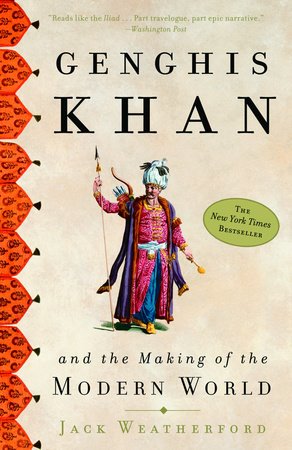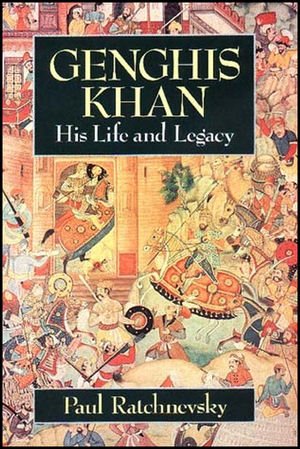This is an instance where we recommend two books. One for being the best popular book, and the other for being the best academic book on Genghis Khan.
The best popular book on Genghis Khan:
Genghis Khan and the Making of the Modern World by Jack Weatherford
This New York Times bestseller is selected because it is arguably the most entertaining read on Genghis Khan. The author retells the personal stories of Genghis Khan and his successors in a way that almost reads like a novel. The reader will also gain insight into how the Mongol empire was created and ran, both the military and non-military aspects, in the context of world history. As such it is also a great book on world history in general.
The best academic book on Genghis Khan:
Genghis Khan: His Life and Legacy by Paul Ratchnevsky
This work is considered to be the definitive academic biography of Genghis Khan. The aim of the book is to approach the historical truth as much as possible through the use and comparison of original source material. Despite being comprehensive and historically accurate, it is surprisingly fast-paced and readable, a rarity amongst definitive academic pieces. For illustration purposes, it includes valuable photos taken in Mongolia in some of the actual locations depicted in the text.
Overview of the current literature on Genghis Khan
Genghis Khan died in 1227, by estimations only a few years after the Mongols adopted a written language, thus there are only a few rare and surviving primary sources from this period that all later works have drawn upon with respect to the factual details regarding the conquer’s life. These include Mangqolun niuca tobchan (The Secret History of the Mongols, estimated to have been written shortly after Genghis Khan’s death and for which there is an English translation), Altan debter (Golden Book), which has been lost but served as the source for a few valuable thirteenth-century textual sources of information.
Despite a dearth of true primary sources. Today we have over a hundred books in the English language alone about the life of Genghis Khan.
Other great books on Genghis Khan
Genghis Khan: His Conquests, His Empire, His Legacy by Frank McLynn
This is a recent (published in 2015) synthesis of contemporary material about Genghis Khan by biographer, historian, and journalist Frank Mclynn, who has published over a dozen biographies along with other historical nonfiction works over four decades. The chapters are organized into coherent topics such as “Chapter 6 – The Character and Personality of the Khan” or “Chapter 15 – Administering the Mongol Empire” instead of the straight chronological order a lot of other works on Genghis Khan adopts.
The Secret History of the Mongols: The Life and Times of Chinggis Khan by Professor Urgunge Onon
The English translation of the key primary source material on Genghis Khan. Arguably every other book on Genghis Khan sources information from this work. It is relatively readable for the layman for a translation of a thirteenth-century Mongolian text. It happens to be one of the oldest surviving literary work in the Mongolian language. When read in combination with more modern works, it is an interesting read for those who are particularly interested in the field of history for a sense of how history is made.
Chinggis Khan (Makers of the Muslim World) by Michal Biran
Michal Biran presents a new perspective on Chinggis Khan, highlighting his significant impact on the Islamic World, both positive and negative. Despite being commonly viewed as a ruthless conqueror and enemy of the faith, Biran argues that his influence on Islam was also substantial, and his legacy can still be seen in Central Asia. The book covers various aspects of Chinggis Khan’s life, including his early years, conquests, the lasting power of his descendants, and how he is depicted in various Muslim contexts. It offers an intriguing look into one of history’s most notorious figures.
Chinggis Khan (Library of World Biography Series) by Ruth Dunnell
The Library of World Biography Series features brief and insightful biographies of individuals who either greatly impacted world events or exemplify important trends and happenings in global history through their actions and thoughts.
The Secret History of the Mongols: A Mongolian Epic Chronicle of the Thirteenth Century (2 Vol. Set) by Igor De Rachewiltz
This two volume set is a comprehensive and scholarly study of the famous Mongolian epic chronicle known as “The Secret History of the Mongols.” The book provides a detailed translation of the text as well as an in-depth analysis of its historical and cultural context. De Rachewiltz’s translation is widely considered to be the most accurate and reliable version of the chronicle available in English. Additionally, the author’s extensive annotations and commentary provide valuable insight into the political, social, and cultural history of the Mongol Empire. Overall, the book is an essential resource for scholars and students of Mongolian and Central Asian history, as well as anyone interested in the history of the Mongol Empire.
The Mongols and the Islamic World: From Conquest to Conversion by Peter Jackson
The Mongols and the Islamic World: From Conquest to Conversion by Peter Jackson is a comprehensive and thought-provoking examination of the relationship between the Mongol Empire and the Islamic world during the 13th and 14th centuries. The book provides an epic historical consideration of the Mongol conquest of Western Asia and the spread of Islam during the years of non-Muslim rule. The author draws on an impressive array of primary sources and modern studies to present a fresh and fascinating perspective on this pivotal period in history.
The Mongol conquest of the Islamic world began in the early thirteenth century when Genghis Khan and his warriors overran Central Asia and devastated much of Iran. Jackson’s unmatched study goes beyond the well-documented Mongol campaigns of massacre and devastation to explore different aspects of an immense imperial event that encompassed what is now Iran, Iraq, Turkey, and Afghanistan, as well as Central Asia and parts of eastern Europe. He examines in depth the cultural consequences for the incorporated Islamic lands, the Muslim experience of Mongol sovereignty, and the conquerors’ eventual conversion to Islam.
This book is a must-read for anyone interested in the history of the Mongol Empire, Islamic history, and medieval history. Jackson offers a nuanced and balanced view of the Mongols and their legacy, challenging the traditional portrayal of them as ruthless conquerors. The book is richly illustrated with maps and photographs and provides a valuable insight into the political, social, and cultural history of the Mongol Empire and the Islamic world.

